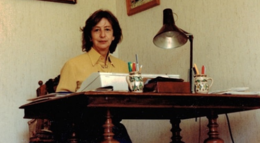Anca Giurchescu | |
|---|---|
 | |
| Born | Rodica Maria Anca Ciortea 19 December 1930 |
| Died | 4 April 2015 (aged 84) Copenhagen, Denmark |
| Citizenship |
|
| Education | National Institute of Physical Education |
| Occupation(s) | Ethnochoreologist, folklorist |
| Years active | 1953–2015 |
| Spouse | Lucian Giurchescu |
| Children | 1 |
Anca Giurchescu née Ciortea (19 December 1930 – 4 April 2015) was a Romanian researcher of folk dance, and an ethnochoreologist, one of the founders of the discipline. Born in Bucharest to a family formerly from Translylvania, she lived in that region as a child. Entering university, she studied dance at the National Institute of Physical Education. During her schooling, she participated in competitive target shooting and was a silver (team) and bronze (individual) medalist in the 1955 European Shooting Championship. While still studying, she began working as a researcher at the Folklore Institute and in 1962 became a member of the International Council for Traditional Music. The Council established a working group which included Giurchescu, that laid the foundation for the science of ethnochoreology.
In 1979, Giurchescu joined her husband in Copenhagen, after attending a seminar in Belfast, and defected. She continued her research into the cultural, historical, and social context of dance and taught throughout Europe and the United States. In 1989, the family returned to Romania, when the Socialist Republic of Romania was overthrown and remained for four years before returning to Copenhagen. She led numerous international research trips to study rituals and dance traditions among various ethnic minorities with roots in Romania and the surrounding countries. She was chair of the Study Group on Ethnochoreology of the International Council for Traditional Music from 1998 to 2006 and founding chair of their Ethnochoreology Sub-Study Group on Field Research Theory and Methods, leading it from 1990 to 2014.